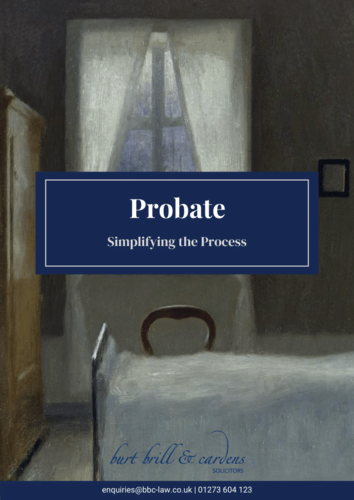When someone doesn’t leave a Will
Dealing with the legal and financial aftermath of a death can add even more strain to you and your family when you are grieving. The process can be made especially difficult if the person who died did not leave a Will.
We are expert probate solicitors who handle many estates, including those where the deceased has not left a Will. If someone has died and you urgently need the advice of a professional, contact our team and we will guide you through your next steps. To speak to us now, call 01273 604123.

Probate
As expert probate solicitors, we talk to many families who are coping with the loss of a loved one at the same time as trying to deal with the legal process of probate. When many of our clients first call us, they often ask if they really need a solicitor for probate.
Letters of Administration are evidence of your authority to deal with the estate of someone who has died, if they didn’t leave a Will behind. If you need to access bank accounts of the deceased, deal with their assets, or sell their property, you will need to prove you have authority to do so with a Grant of Letters of Administration. If you need help applying for the grant, contact us.
When someone dies and leaves behind a Will, their Will should name the people that they wish to take responsibility for dividing up their estate and distributing it to the beneficiaries named in their Will. The people named in the Will to take responsibility for the administration of the estate are called Executors, and they will need to apply for a Grant of Probate to give them authority to handle the estate. When someone dies without a Will, the people given authority to deal with the estate are instead called Administrators, and instead of a Grant of Probate, they need a Grant of Letters of Administration.
The Administration of Estates Act 1925 sets out who should act when someone has died without a Will. These rules also decide who will inherit from the estate. The Act sets out the order of priority and includes a surviving spouse and children. If there are no such persons then often members of the family may be able to apply.
If there are surviving children and a spouse then, depending on the size of the estate, the spouse might not receive everything. The can cause family difficulties and is a good reason to make a Will, even if you think your family circumstances are straight forward.
If someone dies without a Will then the law decides who should receive assets or money from the estate. This is set out in the The Administration of Estates Act 1925 . The Act sets out the order in which people will inherit, starting with a spouse and children. An unmarried partner has no rights under this Act. If you have concerns about who will receive what when you or someone else dies, speak to our experienced probate team on 01273 604 123.
It is worth noting that in some cases, where there are no living relatives to inherit an estate, your assets may go to the Crown. Read more about making a Will.
Stephanie Batts
Stephanie is Head of Probate within our Private Client Department.
Read More About StephanieWe have been very impressed with Burt Brill & Cardens service. Nothing has been too much trouble for any of the staff and they have all been professional, helpful and friendly. They are also very prompt at responding to emails and always send a detailed and thought through reply, answering all of the questions that you have asked.
Get in touch
Speak to one of our solicitors today. We would love to hear from you and discuss any legal issues you may have and how we can assist you.